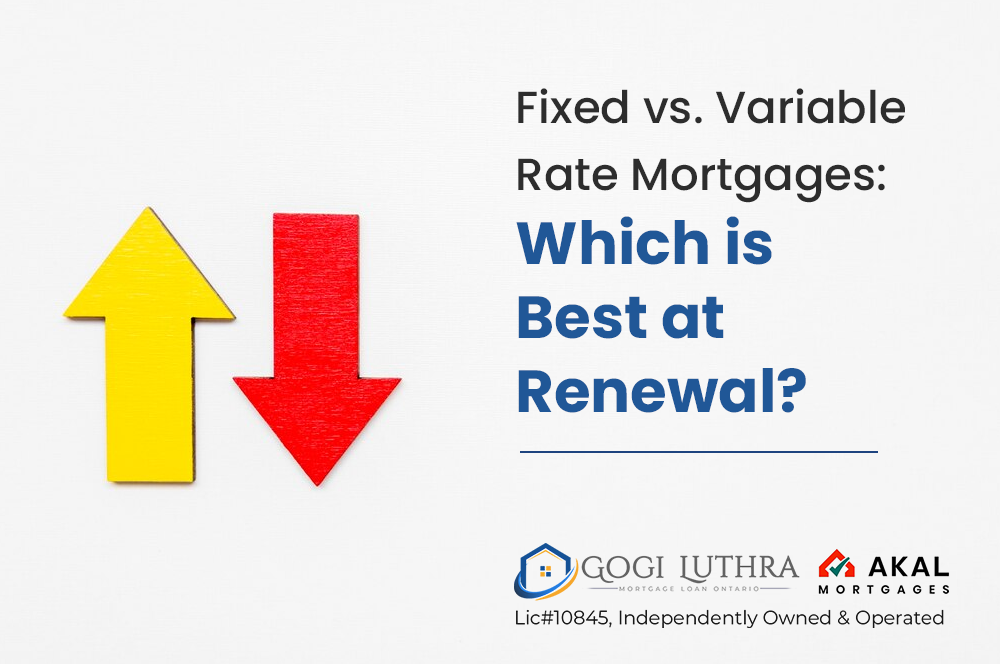When it comes time to renew your mortgage, one of the most important decisions you’ll make is whether to stick with your current fixed or variable-rate mortgage or switch to a different option. This choice can impact your monthly payments, long-term financial health, and ability to plan for the future. In this detailed guide, we’ll explore the differences between fixed and variable-rate mortgages, their pros and cons at renewal, and tips for making the best decision for your financial situation.
Understanding Fixed Rate Mortgages
A fixed-rate mortgage locks in your interest rate for a specific period, usually 5 years in Canada. This means that your monthly payments will stay consistent throughout the term, providing stability and predictability in your mortgage payments. Here are the main advantages and disadvantages:
Pros:
Predictable payments: You’ll know exactly what your payments will be for the mortgage term, which helps with budgeting and financial planning.
Protection from rate increases: If interest rates rise, your fixed-rate remains the same, shielding you from higher payments.
Cons:
Higher initial rates: Fixed-rate mortgages often start with higher interest rates than variable-rate options.
No benefit from falling rates: If market rates go down, you won’t be able to take advantage of lower payments unless you break the mortgage term, which can result in penalties.
Understanding Variable Rate Mortgages
A variable-rate mortgage ties your interest rate to the prime rate set by the Bank of Canada. The rate can change every 6 months to a year, depending on how often your lender adjusts rates. Here’s what you need to know:
Pros:
Lower initial rates: Variable rates are generally lower than fixed rates initially, which can result in lower monthly payments.
Potential for savings: If interest rates decrease, your mortgage payments can decrease, allowing you to pay off your mortgage more quickly or invest elsewhere.
Cons:
Payments can increase: If market rates rise, your payments will increase accordingly, which can lead to financial strain.
Less stability in payments: Variable-rate mortgages can be less predictable, making it harder to budget for long-term financial planning.
Pros and Cons of Renewal
At the renewal stage, homeowners must reassess their mortgage strategy and decide whether to stick with their current rate or make a change:
Fixed Rate at Renewal:
Pros:
Stability in payments: Your monthly costs will remain unchanged throughout the renewed term.
Protection against rate hikes: Ideal for those who prefer financial predictability and are less comfortable with market fluctuations.
Cons:
No advantage from falling rates: If rates decrease, you miss out on potential lower payments unless you break your mortgage, which could incur penalties.
Variable Rate at Renewal:
Pros:
Opportunity for lower rates: If interest rates have decreased, you could benefit from lower monthly payments.
Flexibility: You can change to a fixed-rate mortgage renewal if rates have risen or your risk tolerance has changed.
Cons:
Risk of higher payments: Your monthly payments could increase significantly if rates rise.
Less predictability: The potential for payment changes makes it more challenging to plan your finances over the long term.
Making the Best Choice at Renewal
When it’s time to renew your mortgage, consider the following factors to make an informed decision:
Current Market Conditions: Check whether interest rates are expected to rise or fall. If rates are forecasted to decline, a variable-rate mortgage might be beneficial. Conversely, if rates are expected to rise, sticking with a fixed-rate mortgage could protect you from future rate hikes.
Your Financial Goals: Are you comfortable with the risk of potential payment changes? Do you prefer consistent payments for budgeting purposes? Aligning your mortgage choice with your risk tolerance and financial objectives will help ensure you make the best decision.
Consult a Mortgage Professional: A mortgage broker can provide insights into your options, helping you understand the implications of your choice and potentially negotiating better rates or terms on your behalf.
Conclusion
Choosing between a fixed-rate and variable-rate mortgage at renewal is a significant decision that requires careful consideration. By understanding the differences between these mortgage types, evaluating your comfort with risk, and consulting with a mortgage professional, you can make the best choice for your financial future. Regularly reviewing your mortgage options and planning for changes in market conditions will help you stay ahead in managing your home financing.
FAQs on Fixed vs. Variable Rate Mortgages at Renewal
What is the main difference between fixed and variable rate mortgages at renewal?
The main difference lies in the stability and flexibility of payments. Fixed-rate mortgages lock in your interest rate for a specific period (usually 5 years), providing predictable monthly payments. Variable-rate mortgages have an interest rate that adjusts with the Bank of Canada’s prime rate, meaning your payments can fluctuate based on changes in the market.
Which is better for me, fixed or variable rate at renewal?
The best choice depends on your risk tolerance and financial goals. Fixed rates offer stability and protection from rising interest rates, which is ideal if you prefer consistent payments. Variable rates may provide lower initial payments and potential savings if rates decrease. Consulting with a mortgage professional can help you assess your comfort with risk and future plans.
What happens if interest rates rise after renewing a variable-rate mortgage?
If rates rise, your monthly payments will increase accordingly with a variable-rate mortgage. This can lead to financial strain if your budget isn’t prepared for these changes. To protect yourself from rate increases, you might consider switching to a fixed-rate mortgage at renewal.

